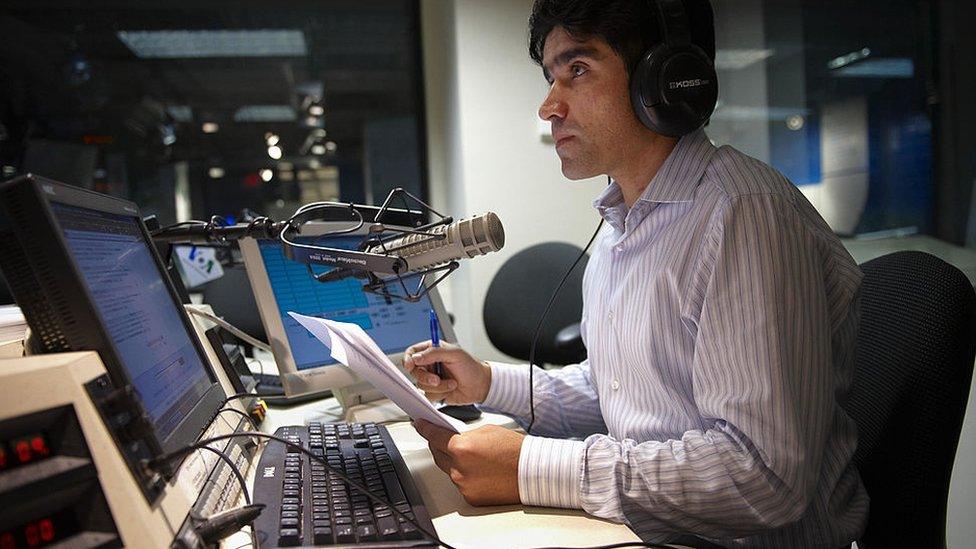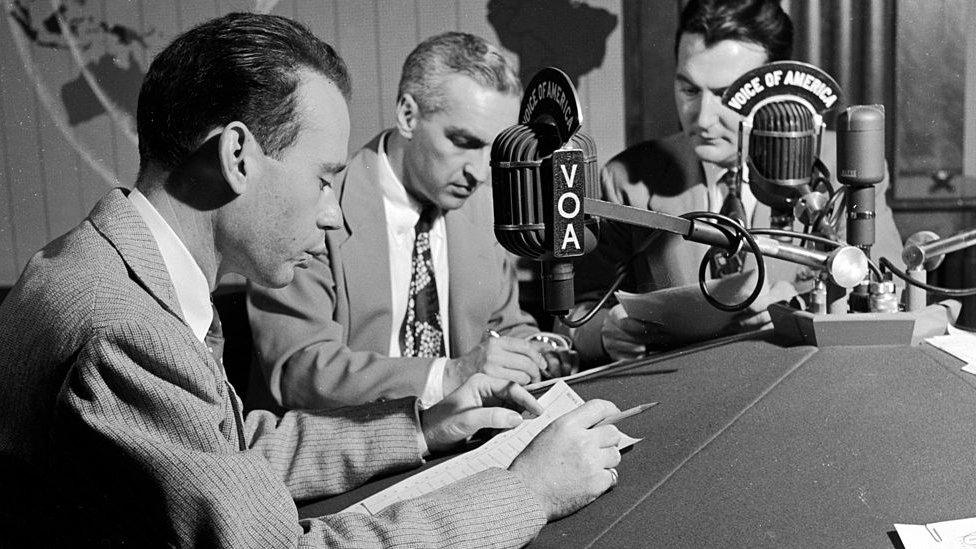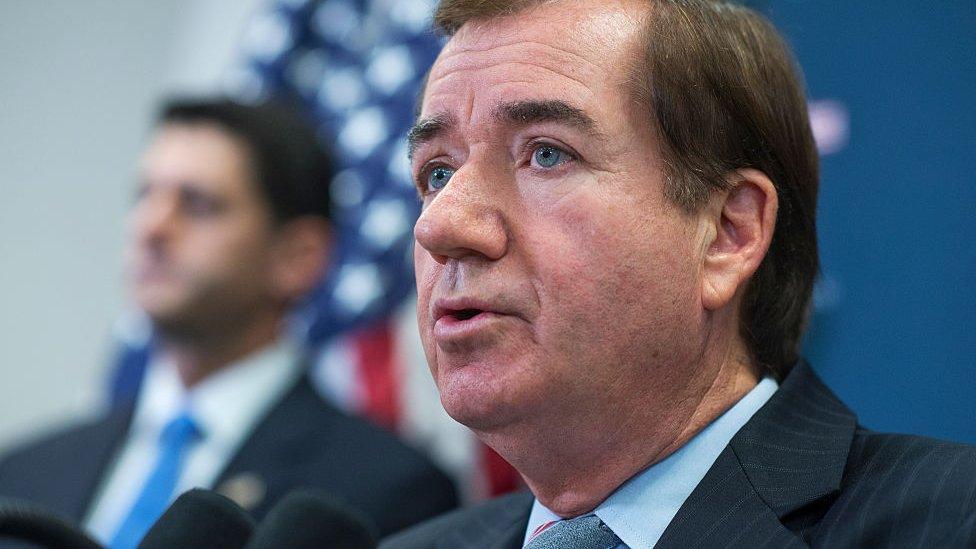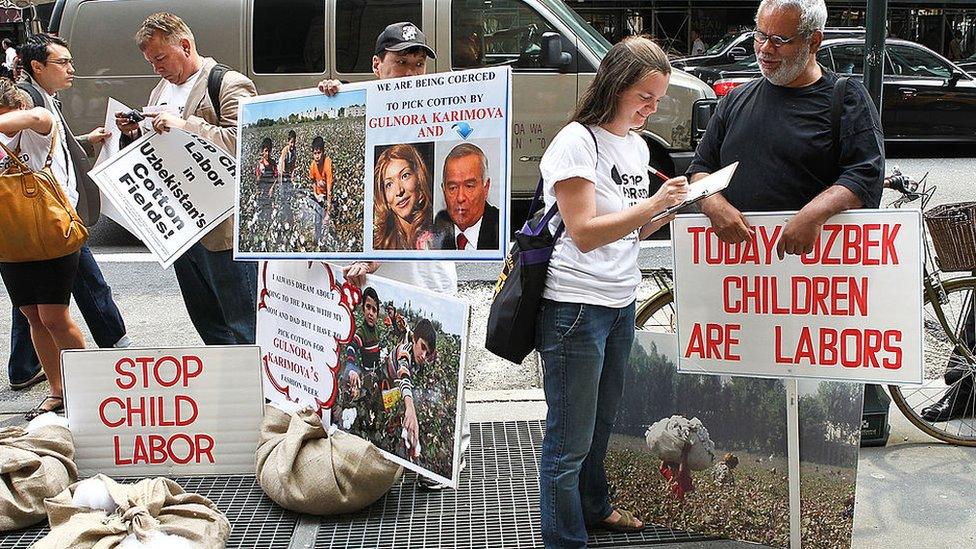Why Voice of America matters outside US
- Published

VOA Afghan Service broadcaster Daoud Sediqi listens to a caller during a show in 2009 in Washington
A US government-funded news service says editorial independence won't be at risk amid a raft of changes. Journalist Adam Harris looks at what Voice of America means to Americans and the rest of the world.
The director of the Broadcast Board of Governors (BBG) is promising the staff of Voice of America (VOA) and other partners that their editorial "firewall" with US policy makers "remains sacrosanct" despite a legislative change to its structure.
A new defence bill has raised concerns about the oversight of VOA and its affiliates, Radio Free Europe/Radio Liberty, Office of Cuba Broadcasting, Radio Free Asia, and the Middle East Broadcasting Network.
The BBG was created to act as "a firewall between US government policymakers and the journalists", as a way to protect editorial independence.
But the new legislation concentrates power within the BBG in the hands of a chief executive, external, appointed by the president and approved by the Senate.
The change caused alarm that future presidents could use the networks, which reach an audience of 287 million people across 100 countries in 61 languages, as a powerful propaganda tool.
In the e-mail, which was provided to the BBC, VOA director Amanda Bennett told staffers that the "legislation makes no change to BBG's statutory firewall," meant to act as a buffer between the government and the newsroom.
"The firewall remains sacrosanct and completely in force, and will continue to ensure, without exception, the professional independence of our journalists and broadcasters," Bennett wrote, adding that the chief executive would be "legally required to abide by and oversee the firewall".
Voice of America launched in 1942 as an alternative designed to combat Nazi and Japanese propaganda. Its first broadcast - made on a transmitter loaned to the United States by the BBC - stated a modest purpose.
"Today, and daily from now on, we shall speak to you about America and the war," said journalist William Harlan Hale. "The news may be good for us. The news may be bad. But we shall tell you the truth."

VOA in 1950
They held fast to that mission even in the grim early days, according to former Voice of America director David Ensor.
"For the first year or two, the news was bad. There were several losses, but VOA faithfully reported it," Ensor says.
In 1976, President Gerald Ford signed the VOA's public charter, safeguarding the organisation's editorial independence, and by 1994, the BBG, with oversight over non-military broadcasting, was established.
In 2013, a shift in legislation allowed VOA and affiliates to begin broadcasting in the United States.
"Some people suggest that VOA is, or should be, a propaganda arm of the government. But VOA is not in the propaganda business, it's in the truth business," Ensor says.
"There have been efforts to rethink VOA," he continued, "but the audience growth comes from building credibility. And the only way to build credibility is by telling the truth."
The legislation that has fuelled the most recent concerns is buried within the National Defense Authorization Act (NDAA) for 2017. The NDAA, which authorises defence spending, can "from time to time authorize certain non-defense related activities," according to VOA director Bennett's e-mail to staff.
The new measure, as a part of the NDAA, was passed by a 92-7 vote in the Senate and shifts power of the Broadcasting Board of Governors into the hands of a chief executive appointed by the president.
It also eliminates the role of the Board as the head of the BBG.
Current members of the board are allowed to complete their terms in office in an "advisory capacity," but will no longer hold any "decision-making, policy-making, or managerial responsibilities".
Once approved, the chief executive will serve for a term of three years and is answerable to the White House.
The change was led by House Foreign Affairs Committee Chairman Edward Royce, a Republican from California, and had bipartisan support.
According to Republican congressional aides, Chairman Royce was alarmed by independent audits which suggested inefficiencies with the part-time BBG board.

Ed Royce has led the charge to change the way VOA operates
The reassurance from top management at BBG has not quelled all fears.
Both current and former newsroom staffers are concerned about breaches of the firewall regardless of political affiliations. Some cited the uptick in BBG town halls to discuss impending changes as a sign top brass is worried as well.
"Honestly, I don't care if it's a Democrat or a Republican in the White House," says Carolyn Presutti, Washington correspondent for VOA.
"We cannot be a part of the administration if we want to stay unbiased, if we want to stay credible, if we want to stay trustworthy."
During November's board meeting, current BBG chief executive John Lansing said the firewall "allows us to be credible around the world where credibility is in decline".
"To the extent that the BBG networks are the only credible, or the primary credible source of news and information in parts of the world starving for news and information, that's the critical mission that we're here to protect."
Therein lies the real value of BBG, says Sarah Kendzior, a writer and researcher on Central Asia.
Much of the best reporting done by VOA and Radio Free Europe (RFE) is not in English or about America.
In the case of Uzbekistan, forced labour and child labour would have gone unreported if not for Radio Free Europe and VOA, Kendzior said.
She says the greatest consequences of the prospect of VOA and RFE losing editorial independence will be faced by their foreign reporters "who are trying to report on the conditions of their country" and the populations they serve.
"All of these issues, in countries that don't have independent media, aren't being covered within the country," she said. "But [they] are being covered by the bridge operation of Radio Free Europe/Voice of America."

Activists protest forced labour and child labour in Uzbekistan - which VOA reported
"If that's taken away you're just going to have a black hole of information."
Jeff Swicord, a 25-year veteran of Voice of America, has seen BBG network journalists who work in hostile countries face consequences.
"I've been overseas quite a bit, and the stuff we report on gets out there," Swicord says. "We've had people targeted. This agency has had people who've worked for them killed, quite frankly, for their affiliation with Voice of America."
Despite some of the fears, VOA director Bennett remained hopeful.
"It's a different structure, it has some good things it has some bad things," she says of the new legislation. "But we really believe in our mission."